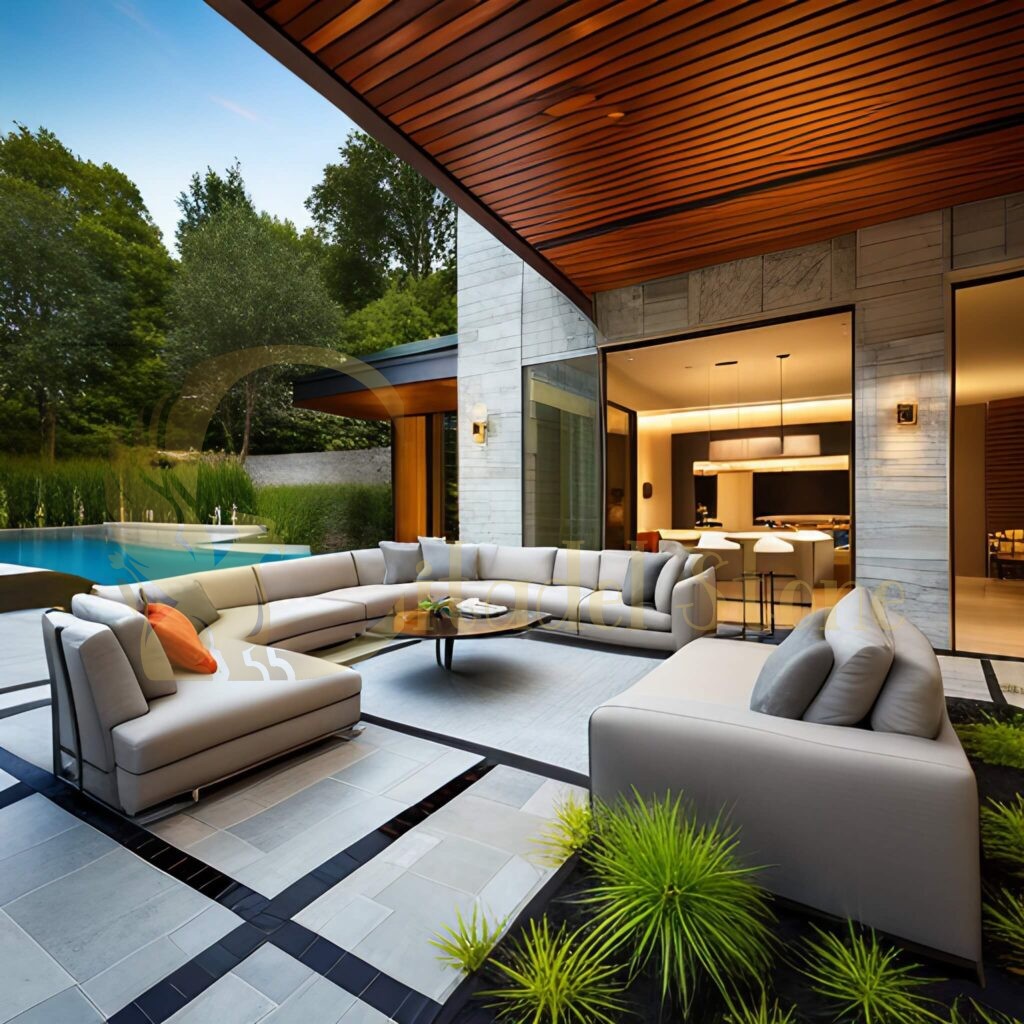1. What is the local climate and rainfall pattern — and how does it affect drainage design?
Understanding your specific rainfall patterns determines drainage requirements, base specifications, and slope calculations for successful paver installations.
Tropical regions experience dramatically different precipitation patterns. Monsoon climates may receive 80% of annual rainfall in 4-6 months, while equatorial areas see consistent heavy downpours year-round. Caribbean islands face seasonal hurricanes with extreme precipitation events.
These patterns directly impact drainage design requirements. Areas with intense seasonal rainfall need robust subsurface drainage and higher capacity stormwater management. Regions with frequent light rain may prioritize surface drainage and slip resistance over extreme event handling.
Action item: Research local meteorological data for average annual rainfall, peak monthly totals, and maximum 24-hour precipitation records. Use this data to size drainage systems and specify appropriate base sections for your tropical paver installation.
Access design guidelines for effective stone usage from your stone supplier.

2. Which paver materials resist salt, UV and biological growth in my area?
Dense, low-porosity materials like granite, basalt, and quality concrete pavers typically outperform porous stones in tropical coastal environments.
Salt air accelerates deterioration of porous materials and metal components. Natural stones with absorption rates below 3% (ASTM C97 testing) generally resist salt damage better than higher-porosity alternatives. UV exposure degrades sealers and can cause color fading in some manufactured products.
Biological growth presents ongoing challenges in humid climates. Algae, moss, and mildew thrive on porous surfaces with organic deposits. Darker colors and textured finishes often hide biological growth better than light, smooth surfaces, though regular cleaning remains necessary.
Consider salt-air pavers with proven coastal performance records. Request documentation of similar regional installations and their performance over 5+ year periods.
Action item: Request ASTM C97 absorption test reports and salt spray resistance data (ASTM B117) from potential suppliers. Ask for reference projects in similar tropical coastal environments. Learn about global stone trends through insights from your natural stone supplier.
3. Should I choose permeable or impermeable paving for stormwater management?
Permeable systems excel for environmental compliance but require more maintenance in tropical climates due to biological growth and sediment loading.
Permeable pavers tropical applications offer significant stormwater management benefits, reducing runoff volumes and peak flow rates during heavy rainfall events. They help meet green building requirements and reduce infrastructure loads on municipal drainage systems.
However, tropical environments challenge permeable systems with heavy organic debris loads, rapid biological growth, and fine sediment that can clog pore spaces. Maintenance requirements increase substantially compared to temperate climates.
Consider hybrid approaches: permeable pavers in low-traffic areas with conventional pavers for high-maintenance zones like pool decks and main circulation paths.
Action item: Calculate your site’s stormwater management requirements and maintenance capacity. Specify cleaning protocols and equipment access for permeable areas during design phase.
Order limestone pavers now to achieve a cohesive indoor-outdoor flow with matching natural stone looks.
4. What thickness, base section and compaction are needed for my expected loads?
Tropical installations typically require enhanced base sections (6-8 inches minimum) and improved drainage compared to temperate climate standards.
High rainfall and humidity create challenging foundation conditions. Saturated soils lose bearing capacity, while repeated wetting and drying cycles can cause settlement and movement. Clay soils common in tropical regions expand and contract significantly with moisture changes.
Base section design must account for both structural loads and drainage requirements. Minimum 6-inch aggregate base with proper gradation provides structural support, while geotextile fabric prevents contamination from subgrade soils.
Compaction becomes critical in humid conditions where moisture content affects achievable densities. Plan for multiple lift installations with moisture control at each stage.
Action item: Conduct soil bearing capacity testing and specify appropriate base materials for local conditions. Include drainage layer specifications and compaction requirements in contractor agreements.
5. How slip-resistant is the finish under wet and oily conditions?
Textured finishes like bush-hammered, flamed, or sandblasted provide essential slip resistance, while polished surfaces become dangerously slippery when wet.
Tropical environments mean surfaces stay wet for extended periods from rainfall, humidity, and frequent cleaning. Pool areas face additional challenges from sunscreen oils and body lotions that create slippery films on smooth surfaces.
Different textures perform differently when wet. Bush-hammered finishes provide excellent traction but may be uncomfortable for barefoot use. Sandblasted surfaces offer good slip resistance with more comfortable texture for pool decks.
Test slip resistance under actual use conditions, not just laboratory settings. Wet testing with typical contaminants (oils, soaps) reveals real-world performance.
Action item: Request slip resistance test data (ASTM C1028 or equivalent) for both dry and wet conditions. Specify finish requirements for different application areas in your project documents.
Purchase limestone tiles to create a timeless courtyard or garden path—available for shipping now.

6. How will you handle mockups, sample approvals and color variation?
Mockup panels become essential in tropical climates to evaluate drainage performance, slip resistance, and appearance under intense UV exposure.
Tropical sunlight reveals color and texture variations that aren’t apparent in indoor showrooms or small samples. UV intensity can quickly fade some materials or highlight color inconsistencies between production lots.
Weather resistance testing requires extended outdoor exposure. Plan for 30-60 day mockup periods to evaluate performance through typical wet/dry cycles and intense sun exposure.
Color variation acceptance criteria need clear documentation. Natural stone shows inherent variation that may be more pronounced in tropical lighting conditions.
Action item: Schedule mockup installation at least 60 days before major material orders. Include drainage testing and slip resistance evaluation in mockup approval process.
Start your home renovation with our beautiful white limestone pavers.
7. What are realistic lead times, shipping constraints and staging strategies in tropical locations?
Island and remote tropical locations require 8-16 week lead times with careful staging around hurricane/monsoon seasons.
Shipping logistics become complex for tropical installations. Container shipping provides the most economical transport for substantial quantities, but port facilities and inland transport may be limited in remote locations.
Seasonal weather patterns affect delivery scheduling. Hurricane seasons (June-November in the Atlantic) or monsoon periods may restrict material deliveries and installation work for months.
Storage requirements increase for longer lead times and weather protection needs. Materials may require covered storage for extended periods while awaiting installation windows.
Action item: Map out seasonal weather constraints and plan material delivery schedules accordingly. Verify local port capabilities and inland transport options for your specific location.
8. What maintenance, sealing and warranty expectations should be written into the contract?
Tropical maintenance requirements typically double compared to temperate climates due to biological growth, UV exposure, and salt air effects.
Sealing frequencies increase substantially in tropical environments. Pavers in humid climates may require annual sealing compared to 2-3 year cycles in temperate regions. UV degradation and biological growth accelerate sealer breakdown.
Cleaning protocols become more intensive with weekly to monthly pressure washing needed for algae and mildew control. Specify appropriate cleaning products and equipment access during design phase.
Warranty terms should reflect tropical performance expectations. Standard warranties developed for temperate climates may not adequately cover tropical-specific issues like biological staining or accelerated UV degradation.
Action item: Specify maintenance schedules, approved cleaning products, and warranty terms that reflect tropical performance realities. Include provisions for biological growth treatment and sealer replacement intervals.
Buy high-performance pavers Bahamas for commercial projects — Request a brochure.
Quick Pre-Installation Checklist (Tropical Pavers)
- Verify local rainfall data and size drainage systems for peak precipitation events
- Request absorption test reports (ASTM C97) and salt spray resistance data for all materials
- Specify minimum 6-inch aggregate base with proper drainage and geotextile separation
- Test slip resistance under wet conditions with typical contaminants (oils, soaps)
- Plan 60-day mockup period for UV exposure and drainage performance evaluation
- Schedule deliveries outside hurricane/monsoon seasons with adequate covered storage
- Include enhanced maintenance specifications for biological growth control
- Document warranty terms that address tropical-specific performance issues
Frequently Asked Questions
How often do pavers need sealing in tropical climates? Most pavers require annual sealing in tropical environments compared to 2-3 years in temperate climates. UV intensity and biological growth accelerate sealer breakdown significantly.
Should I order extra pavers for tropical installations? Yes, plan for 15-20% overage compared to standard 10% for temperate projects. Account for potential storm damage, higher installation waste, and future maintenance needs.
How do I prevent algae growth on pavers? Regular cleaning (weekly to monthly), proper drainage to eliminate standing water, and antimicrobial sealers help control biological growth. Textured surfaces often hide growth better than smooth finishes.
Can I install pavers during rainy season? Installation quality suffers during heavy rainfall due to base compaction issues and drainage problems. Plan installation during dry seasons when possible, with covered storage for materials.
What’s the best way to handle efflorescence in humid climates? Use low-alkaline mortars and sealers, ensure proper drainage, and plan for more frequent cleaning. Efflorescence appears more readily in high-humidity conditions but typically diminishes over time.

Real-World Case Studies: Citadel Stone’s Six Strategic Projects for High-Demand Caribbean Cities
Mayagüez, Puerto Rico — university district meets coastal commerce
Why natural stone matters here
Mayagüez combines university campuses, light industrial zones and coastal neighbourhoods. Projects require stone that balances academic-grade finishes (lecture halls, civic buildings) with rugged, low-maintenance materials for seafront promenades and logistics yards.
Materials & typical uses
Low-porosity limestone tiles for interiors and lobby cladding (keeps dust down and is easy to clean).
Reinforced coral-limestone curbs and cobbles for seafront promenades and utility corridors.
Factory-cut travertine nosings and step units for campus stairways to reduce onsite cutting and improve safety.
Procurement & technical tips
For mixed-use municipal projects, bundle interior and exterior stone orders so you can negotiate batch pricing and minimise colour variation.
Require pre-drilled coping and nosing units where heavy foot traffic or trolleys are anticipated to avoid on-site grinding.
Insist on a small on-site mockup by exposure type (sun, shade, spray) so the university and municipal stakeholders can approve the finish under real conditions.
Supplied a university civic plaza with factory-prefinished travertine modules that slotted into a tight installation window, reducing scaffold and labour costs by 27%.
Engineered a two-tier coastal curb system (interlocking coral-limestone + polymeric joint) that cut lateral settlement and simplified future repairs for the municipality.
Ran a handover session with campus facilities staff covering gentle cleaning cycles and seasonal inspections, which reduced unnecessary abrasive cleaning and extended finish life.
Les Abymes (Pointe-à-Pitre metro area), Guadeloupe — industrial heart, heritage edges
Why natural stone matters here
Les Abymes services one of the region’s busiest commercial and cargo clusters yet sits adjacent to heritage districts. Supply must be robust for port logistics but adaptable in finish where historic streets are being upgraded.
Materials & typical uses
Heavy-duty basalt and dense sandstone for cargo aprons and truckways.
Hand-cut setts and cobbles for adjacent heritage walkways to blend with older masonry.
Permeable paving units with reinforced bedding for stormwater management in new urban blocks.
Procurement & technical tips
For port-adjacent works specify compressive-strength documentation and abrasion testing rather than vague durability claims.
Use modular cobble sets with a documented matching protocol if mixing reclaimed and new stock, so joints remain visually consistent.
Stage deliveries to off-peak port times and use smaller crates to suit narrow town loading zones.
How Citadel Stone helped
Delivered abrasion-rated basalt paving for a commercial apron that reduced repaving frequency; Citadel’s acceptance criteria included field skid tests to validate performance.
Matched reclaimed cobbles with new hand-cut setts for a streetscape program so the new lanes read as continuous fabric with the old quarter.
Introduced a permeable paving pilot with factory-insert joint retainers that accelerated site works and improved first-season infiltration.
Colón, Panama — industrial port upgrades with urban regeneration needs
Why natural stone matters here
Colón requires heavy-duty stone for quay and logistics upgrades while simultaneously pursuing urban regeneration along waterfront corridors. Materials must perform under heavy loading and also present well for civic promenades and tourism activation.
Materials & typical uses
High-strength granite and engineered limestone for quay aprons and heavy cargo routes.
Textured limestone pavers and precast coping for waterfront promenades and public seating.
Reinforced modular seawall faces designed to be replaced panel-by-panel.
Procurement & technical tips
Demand third-party compressive-strength and salt-crystal resistance testing for quay materials.
For regeneration fronts, specify reversible anchoring and ventilated back-profiles so future works don’t damage original substrates.
Coordinate delivery windows with port operators to avoid demurrage and stack stones on purpose-built racks to speed offloading.
How Citadel Stone helped
Supplied pre-cut granite bands and reinforced limestone promenade panels that sped installation and reduced on-dock cutting by over 80%.
Developed a modular seawall facing system that can be removed and replaced in single-panel sections—cutting future repair windows and minimizing disruption to port operations.
Produced an easy-to-use maintenance log and training session for port maintenance crews to ensure correct cleaning and salt mitigation practices.
Limón, Costa Rica — rainforest coastal port with eco-sensitive needs
Why natural stone matters here
Limón’s tropical rainforest climate and active port require stone solutions that resist constant moisture, biological growth and heavy loading while avoiding materials or maintenance regimes that can harm nearby coral and riverine ecosystems.
Materials & typical uses
Dense quartzitic sandstone for vehicle corridors and cargo zones (resists abrasion and biological fouling).
Permeable limestone pavers for boulevard and plaza work to improve stormwater handling.
Textured coping and pool edges in resorts that minimise slipperiness while blending with lush landscapes.
Procurement & technical tips
Specify bio-resistant finishes and recommend cleaning protocols that avoid high-phosphate detergents to protect local waterways.
For permeable systems, require infiltration testing and a simple maintenance schedule to avoid later clogging.
Use local staging areas shaded and ventilated to keep stone from becoming algae-coated before installation.
How Citadel Stone helped
Designed permeable promenade pavers with integral sediment traps and provided a three-step maintenance regime that local workers could implement with existing equipment—protecting adjacent river outflows.
Supplied heavy sandstone curb bands pre-drilled and pre-sealed to reduce on-site wet cutting and eliminate aggressive sealants near sensitive habitats.
Ran a short contractor briefing on eco-friendly cleaning agents and sediment control measures during rainy-season installs.
Cienfuegos, Cuba — elegant port city with conservation priorities
Why natural stone matters here
Cienfuegos’ elegant 19th-century grid and waterfront boulevards require sympathetic stonework that preserves the refined aesthetic of the bayfront while improving resilience against salt and humidity.
Materials & typical uses
Polished and honed limestone for civic facades and hotel lobbies.
Hand-tooled sandstone steps and cobbles for narrow streets and small plazas.
Marine-grade coping and antiscaling seawall facings for small port repairs.
Procurement & technical tips
Use lime-compatible mortars and breatheable anchoring where new stone interfaces with older masonry to maintain moisture equilibrium.
For visible public zones, require small trial panels adjacent to the final location to validate colour and weathering before large orders.
For seawall works, demand salt-crystal testing and specify sacrificial grout joints to simplify future maintenance.
How Citadel Stone helped
Executed a hand-tooling program that replicated period tooling marks so new repairs blended almost seamlessly with original facades.
Supplied prefabricated coping units with integrated grout pockets, reducing the need for lift equipment near the quay edge and improving worker safety.
Delivered a short conservator’s brief for local heritage officers outlining reversible fixing strategies and a low-impact cleaning programme.
Maracaibo, Venezuela — major coastal node with industrial and climatic pressures
Why natural stone matters here
Maracaibo faces intense sun, saline lagoons and heavy industrial traffic. Stone must tolerate abrasive dust, thermal cycling and be economical where municipal budgets are constrained.
Materials & typical uses
Dense granites and engineered limestone in industrial corridors and transit hubs.
Light-toned, heat-reflective pavers for shaded market streets and covered arcades.
Reinforced seawall facings and precast edge units for lagoon embankments.
Procurement & technical tips
Use thermal-reflective surfaces for sunny market canopies to reduce surface heat and improve pedestrian comfort.
For industrial paving, prioritise abrasion index and documented life-cycle comparisons over initial unit price.
Choose modular systems for seawalls that can be replaced in sections to limit future logistics complexity.
How Citadel Stone helped
Supplied a mixed-grade paving solution: heavy granite in loading zones and reflective limestone in pedestrian aisles, which lowered municipal repaving cycles and improved daytime comfort.
Designed prefabricated lagoon facing panels with interlocking joints to resist washout and simplify future maintenance.
Worked with a local contractor to pilot a low-dust sweeping and rinse protocol that reduced abrasive deposition on high-value stone finishes, extending their service life.
Buy luxury Stone Pavers Bahamas — Free samples available.
Conclusion
Success with pool deck pavers tropical installations depends on asking the right questions before work begins. Tropical environments demand enhanced drainage design, careful material selection, extended lead times, and intensified maintenance protocols. The investment in proper planning and specification pays dividends through improved performance, reduced maintenance costs, and extended service life.
Ready to move forward with your tropical paver project? Understanding these critical factors positions you for installation success that will withstand years of challenging tropical conditions.
Need project help? Request a tropical paver sample kit or a site review from Citadel Stone. Take the first step toward your dream project with products from your best stone supplier!

